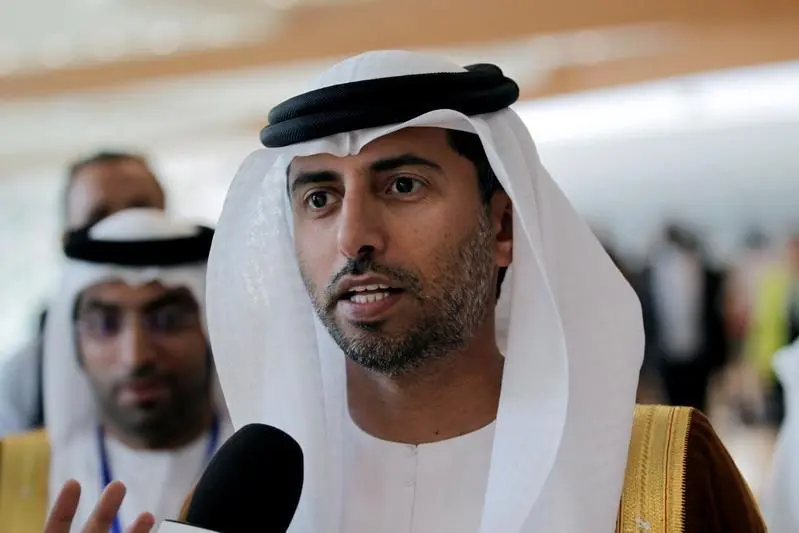PHOTO
The nine-month rollover of production cuts by Opec and allies will help maintain the oil market well-balanced and keep investors happy, UAE Minister of Energy and Industry Suhail bin Mohammed Faraj Faris Al Mazrouei said on Tuesday.
Speaking to reporters on the sidelines of the Global Manufacturing and Industrial Summit (GMIS) in the Russian city of Yekaterinburg, Al Mazroui said following the agreement to extend the cuts, the oil producers expect the market gradually but steadily moving into balance in the second half.
The minister's remarks came as oil rose towards $65 a barrel on Tuesday as supply cuts and Middle East tensions outweighed the US-China trade dispute that has been dragging down the global economy and oil demand.
Opec and allies reached a deal to extend production cuts until March 2020 last week. The Middle East-dominated producer group was able to overcome their differences after five hours of negotiating in Vienna. The energy alliance has said it had made the decision to prolong production cuts "in view of the underlying large uncertainties and its potential implications on the global oil market."
"I do not think IR 4.0 is going to lessen dependence on expatriate professionals. The focus will be on retraining, reskilling and redeploying the workforce as robots will be taking over many of the tasks, while enhancing productivity and safety," Al Mazroui said.
Earlier, at the opening of GMIS, which drew over 2,500 officials and dignitaries from all over the world, including leaders from the host country, the Russian Federation, the UAE, China, Austria, and India, as well as representatives from the United Nations Industrial Development Organisation, and other United Nations entities, Al Mazrouei told delegates that the summit offered a way to share learnings on the Fourth Industrial Revolution and how it is transforming our way of life and can contribute to the prosperity of humankind by advancing the United Nations Sustainable Development Goals.
He told the audience that the UAE is fully committed to advancing its manufacturing sector and that the country is putting these words into action by launching multiple initiatives, such as appointing the first Minister for Artificial Intelligence in the world, launching a national strategy for advanced innovation, and the establishment of the Dubai 3D printing strategy. He said these initiatives would prepare the UAE to play a key role in the Fourth Industrial Revolution.
Delivering the welcome address, Badr Al Olama, head of the Organising Committee, Global Manufacturing and Industrialisation Summit, focused on how mankind must turn to nature for inspiration as the world develops new technologies in order to provide a path to a more sustainable future for humanity.
"As custodians of the planet, we have a collective responsibility to protect it for all humanity. In an era in which the general talk is of smart phones, smart cars, and smart homes, it is smart thinking that is needed to turn a serious mind to our relationship with one another, and with society as a whole. The early seeds that were planted at the Paris Climate Accord are now taking root. We must not let ourselves stray away from the commitments that were made; commitments that were made with future generations in mind," said Al Olama.
Dmitry Kozak, Deputy Prime Minister of the Russian Federation delivered a special address to delegates, welcoming them to Russia and emphasising Yekaterinburg's 'rightful claim' to being the country's industrial capital thanks to its established manufacturing base. Kozak stressed that the GMIS serves as a platform to strengthen industrial manufacturing cooperation and provide for a coordinated understanding of the future at a time when economic competition and rivalry was creating uncertainty.
LI Yong, director-general, Unido, said that technology offered the promise of making manufacturing more efficient, which could help achieve the 17 Sustainable Development Goals. He cited the example of how drone technology is being used for precision agriculture which was contributing to global food security. Though the benefits of Fourth Industrial Revolution technologies should not be underestimated, he said, we must be aware of the risks that new technologies might present so that we can prepare accordingly and focus on prosperity in the new industrial era.
"The Fourth Industrial Revolution will affect everyone, so everyone must be listened to; this is why we have created GMIS - to promote sustainable industrial development and to promote sectors that are not well-known, nature-inspired technology being one such sector," said Yong.
Denis Manturov, Minister of Industry and Trade, Russian Federation, said the changes being brought about by advanced technology would make manufacturing more efficient and raise living standards for the whole world. He said all countries must prioritise the task of the rebuilding the biosphere, and key to this is the development of nature inspired technology, which can inspire us to advance without harming the environment. He also emphasised Russia's determination to become a leader in nature inspired technologies.
Copyright © 2019 Khaleej Times. All Rights Reserved. Provided by SyndiGate Media Inc. (Syndigate.info).





















